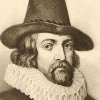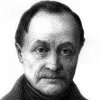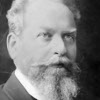Famous Modern Philosophers
Modern philosophy got its start in Western Europe during the Seventeenth Century. Here are the most famous philosophers from the Seventeenth, Eighteenth, Nineteenth, and Twentieth Centuries, whose teachings and theories create the shape of modern philosophy.
Seventeenth Century Philosophers(1600’s) |
||
 |
Sir Francis BaconEnglish |
Sir Francis Bacon advocated the use of inductive reasoning (as opposed to the deductive reasoning used by the rationalists of his day) and is hence known as the father of empiricism. He was also very influential in developing the modern scientific method. Sir Francis Bacon: The Fifty-Nine Essays |
 |
Thomas HobbesEnglish |
One of the earliest modern philosophers to hold a materialist worldview, Thomas Hobbes is primarily remembered for his contributions to political philosophy. He wrote Leviathan and argued for concepts such as individual freedoms, equality, and representative government. He also believed that humans are naturally anarchic and need a sovereign to rule over them. Note: The tiger in the comic Calvin & Hobbes is named after him. Leviathan |
 |
Rene DescartesFrench |
Rene Descartes is often called the father of modern philosophy. Together with Spinoza and Leibniz, he is considered one of the three great continental rationalists. He is also known for espousing a dualism.Descartes made many important contributions to the field of mathematics but is perhaps most famous for his saying “Cogito ergo sum” (Latin for “I think, therefore I am“). Basically, he wanted to know whether or not there was anything in this world that we could really know for sure. He started by doubting everything, even his own existence. However, he came to the conclusion that if he was thinking about the question, “Do I exist?” then he must exist, otherwise there wouldn’t be an “I” to ask the question. Discourse on Methods and Meditations on First Philosophy |
 |
Baruch SpinozaDutch, of Jewish origin |
Baruch Spinoza rejected the mind-body dualism of Descartes and is often considered to have held a more pantheistic worldview, arguing that all things are ultimately one. He believed in an impersonal God and took a critical approach to the Bible and this led to his writings being strongly condemned by religious leaders. Spinoza: A Very Short Introduction |
 |
John LockeEnglish |
John Locke was the first of three great British empiricists (the other two being Berkeley and Hume). He is most famous for his idea of the “tabula rasa” (Latin for “blank slate”). Basically, he felt that we are all born with a mind that is like a blank sheet of paper. As we go through life, we have experiences (all of which come by way of our five senses) and that everything we know or think of is a product of these experiences. Known as the father of liberalism, he also advanced social contract theory but disagreed with Hobbes’ support of the absolute monarchy.Note: A character from the TV show Lost is named after him. The Essential John Locke Collection |
 |
Gottfried LeibnizGerman |
The last of the three great continental rationalists, Gottfried Leibniz believed that our world was the best possible world that God could have created. He is also remembered for his contributions to mathematics… he developed calculus independent of Newton and played a major role in the development of the binary number system and mechnical calculator. Leibniz: Philosophical Essays (Hackett Classics) |
Eighteenth Century Philosophers(1700’s) |
||
 |
George BerkeleyAnglo-Irish |
George Berkeley was an Anglican bishop and stands out because of his extreme idealism. He believed that our thoughts and sense perceptions are the only things that really exist. According to Berkeley, the material world is not really real — “we” are all actually just thoughts existing inside the mind of God! Principles of Human Knowledge and Three Dialogues Between Hylas and Philonous (Penguin Classics) |
 |
VoltaireFrench |
Voltaire was the pen name for Francois-Marie Arouet, one of the key figures of the Enlightenment era. His ideas on civil liberties and social reform helped pave the way for the French and American revolutions. As a deist, he focused more on understanding nature through the use of reason as opposed to making appeals to authorities such as the church. Candide |
 |
David HumeScottish |
David Hume’s empiricism was materialist (as opposed to idealist, like Berkeley’s) in that he mostly focused on what can be directly observed and experienced in the material world. He believed that every idea in our mind can be traced to real things that we have experienced. For example, we might have an idea of an “angel” (without having ever experienced one) but that is simply a combination of the idea of a “man” and the idea of “wings”. Definitely a skeptic, he is thought by some to also have been one of the earliest modern atheists.It is often been pointed out that many of his ideas were similar to those of the Buddha. Hume: A Very Short Introduction |
 |
Jean-Jacques RousseauGenevan |
Jean-Jacques Rousseau was an important figure in the Romantic movement and made key contriutions to educational and political theory. He believed in the innate goodness of humans (contra Hobbes) and felt that it was society that corrupts us. Rousseau: A Very Short Introduction |
 |
Adam SmithScottish |
Adam Smith is considered the father of modern economics. He wrote The Wealth of Nations, in which he advocated the idea of free market economies. The Wealth of Nations |
 |
Immanuel KantGerman |
Immanuel Kant is often considered to be the most important modern philosopher. This is because he built a bridge between rationalism and empiricism. He believed that all knowledge comes from the senses but is filtered through our rational minds. Therefore there is a difference between how things really are (the thing in itself) and how things are experienced by us (the thing for me). Kant: A Very Short Introduction |
 |
J.W. von GoetheGerman |
J. W. von Goethe is often remembered as being more of a literary great than a philosopher (his masterpiece being Faust), but in reality, he was both, and more. He is associated with Romanticism, a movement that put a greater emphasis on feeling in reaction to the over-emphasis on reason that was common during the Enlightenment. Faust |
Nineteenth Century Philosophers(1800’s) |
||
 |
G. W. F. HegelGerman |
G.W.F. Hegel was an idealist but not in the extreme like Berkeley. He is associated with the Hegelian dialectic — a method of dialogue that involves presenting a thesis, followed by an anti-thesis, and finally a synthesis.He was very influential both in terms of later thinkers who agreed with him (like Marx) as well as thinkers who developed new ideas in opposition to him (like Kierkegaard). Phenomenology of Spirit |
 |
Auguste ComteFrench |
Auguste Comte is known as the founder of sociology and positivism, the latter being the view that the only authentic knowledge is that which we can experience and verify scientifically. Introduction to Positive Philosophy (Hackett Classics) |
 |
John Stuart MillBritish |
John Stuart Mill was a proponent of utilitarianism (“the greatest happiness to the greatest number of people”) and made important contributions to liberal political philosophy and the philosophy of science. On Liberty |
 |
Soren KierkegaardDanish |
Soren Kierkegaard is considered the father of existentialism, although his was a theistic existentialism as opposed to the more common atheistic existentialism of Nietzsche and Sartre. He believed that individuals were responsible for their own lives and espoused a passionate, irrational faith based on a leap in the dark. Kierkegaard: A Very Short Introduction |
 |
Henry David ThoreauAmerican |
Henry David Thoreau was a key figure in American transcendentalism (which focused on an intuitive spirituality over traditional religious beliefs). He wrote Walden and was a proponent of simple living and civil disobedience. Walden |
 |
Karl MarxGerman |
Karl Marx wrote The Communist Manifesto with Friedrich Engels, which opens with the lines, “The history of all hitherto existing society is the history of class struggles” and thus laid the groundwork for modern communism and socialism. The Communist Manifesto |
 |
William JamesAmerican |
William James is best known for supporting pragmatism (the belief that ideas are meaningful only if they “work”), his work on the psychology of religious experiences, and his will-to-believe doctrine (the idea that some truths must be accepted without evidence). He was the brother of Henry James, an important American writer. The Varieties of Religious Experience |
 |
Friedrich NietzscheGerman |
Friedrich Nietzsche is most famous for the statement, “God is dead.” which comes from a story he wrote about a madman who goes around a village shouting, “Where is God?” Finally, the madman answers his own question and says, “God is dead… and we have killed him.” Nietzsche was referring to the great change that had happened in Europe during the nineteenth century. Up to that point, the Christian God had been the foundation for morality and people’s purpose in life. However, science and secularism had grown to a point where many people felt God was no longer necessary. Nietzsche’s radical questioning of objective truth had a profound influence on existentialism, nihilism (the idea that life has no purpose or meaning), and postmodernism. Nietzsche: A Very Short Introduction |
Twentieth Century Philosophers(1900’s) |
||
 |
Edmund HusserlGerman |
Edmund Husserl founded the phenomenology movement, which sought to systematically determine the essential properties of consciousness by reflecting upon the subjective phenomena we experience. |
 |
Bertrand RussellBritish |
Bertrand Russell was one of the founders of analytical philosophy, a school of thought that uses scientific methods to solve philosophical problems and which tends to dominate in the US and UK in contrast to the existentialism and Marxism found in mainland Europe. One of his best known popular works is Why I Am Not a Christian. |
 |
Ludwig WittgensteinAustrian-British |
A student of Bertrand Russell, Ludwig Wittgenstein is sometimes referred to as the greatest philosopher of the twentieth century. He believed that the meanings of words reside in their ordinary uses and that philosophers often distort their meanings and end up playing ‘language games’. |
 |
Jean-Paul SartreFrench |
Jean-Paul Sartre is probably the most famous existentialist and is known for the phrase “existence precedes essence“. Instead of starting with the idea of purpose and then humans existing because of that purpose, existentialists start with the existence of humans and emphasize that human’s must create their own meaning and purpose.Sartre’s lover, Simone de Beauvoir was also a famous philosopher and an important feminist. Being and Nothingness |
Modern Philosophy: An Anthology of Primary Sources, 2nd Edition

Descartes should have said “I think therefore I thought.” Not proving an existence but subjectivity. Just a thought.